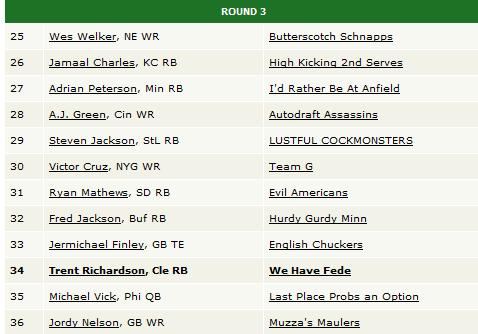Living in a Fantasy
In mid-March while listening to Chad Millman’s Behind the Bets podcast, the topic of discussion was fantasy sports versus sports betting and whether the two had any similarities or connections. On the show Millman invited guests Jeremy Levine and Peter Jennings from Star Street – a daily fantasy game – as well as New York Times author Joshua Brustein to discuss the issues at hand.
Sports betting has not been granted the nationwide go ahead in terms of online gaming yet the fantasy games with monetary prizes behind them have received the green light. The distinction being made is that fantasy sports are a game of skill while sports betting are games of luck. To believe such a distinction is true there is a fair chance that you also believe in Santa Claus. That’s nothing to be ashamed of if you’re still nine years old, but for any adult who has assessed the situation the excuses for believing so are paper thin.
During the episode Levine and Jennings contend that daily fantasy games are not the same as sports betting because there is a skill required in assessing value and projections in the daily performance of players. They believed fantasy sports can clearly be defined as a skill game – which I, too, believe – as the better players consistently beat lesser players. In essence the cream always rises.
That is indeed true over the long haul but it’s also entirely true for sports betting. There is a reason professional gamblers are professional gamblers and not your average square bettor, due to the fact they consistently find value in the market and beat lines long term. To believe there is a distinction in the skills required to be a good fantasy sports player compared to a professional sports bettor is laughable.
In fact, anyone who is a professional sports bettor is invariably brilliant at fantasy sports. Why? They understand the importance of value and projections within match-ups, be it over the course of a particular match or over a full season.
Millman makes the point to Levine and Jennings that everything they describe with respect to how a good fantasy sports player goes about their business is exactly the same as any good sports bettor. Levine and Jennings respond that it’s not the same because a bookmaker is looking for equal action on a line that moves, whereas a fantasy player’s value stays at one level for the day in question.
The response was nothing more than a red herring. It’s irrelevant that a bookmaker will move a line as a good sports bettor is only going to jump on the line when they have identified value and an edge. A good sports bettor will not play any line and match available in the same way a good fantasy player will not choose to purchase or select a particular player if the projection and match-up doesn’t reach a level where they believe expectations can be exceeded.
Let me give you an example of sports betting value versus fantasy sports value.
Last season Adrian Peterson entered the NFL season with questions surrounding the strength of his knee in the wake of season ending ACL surgery. It wouldn’t have been unrealistic to expect Peterson to miss the entire season since he picked up his injury at the end of the previous regular season. Peterson, as we all know, is one of the best running backs in the NFL, if not the best. He would ordinarily go in the first round of any fantasy draft and usually head the betting in terms of who was favoured to be the league’s top rusher.
Would I have looked to take Peterson in the first round of my NFL draft last season? No. Why? It would have been a poor value pick. We had no idea how many carries Peterson was likely to get in the first few weeks of the season and with the added risk of coming back too soon from injury it just didn’t make sense.
In my 12 team draft Peterson was selected early in the third round and was the 11th running back taken – which would never happen aside from his injury. As the 11th back taken he was probably a risk worth taking at that point, the potential of getting a star performer with limited downside made sense to most shrewd owners.
In late July Peterson’s price with UK bookmakers was as high as 28/1 to win the rushing title. Personally I felt this price was too good to ignore even accounting for the injury. Reports had surfaced that Peterson was intent on playing from week one and my view was a small wager at 28/1 each-way (1/4 odds 1-4 places) was worth a shot. Would I have backed Peterson at 5/1 or 6/1 as he would be priced in any other year under the circumstances? No, absolutely not. That would have been insane. It would have been an awful projection of his capability given the injury he was attempting to overcome.
My realistic hope was that if Peterson could get 10-15 carries from week one and work his way back in that potentially I might have a decent bet at 7/1 for him to finish amongst the top four rushers that season. As we all know, Peterson redefined the phrase “impossible is nothing” by having an outstanding year and won the rushing title by a landslide.
The point being I wouldn’t have taken Peterson as a sports bettor at 6/1 in the same way that I didn’t consider to draft him in the first round of my fantasy league. While at 28/1 he became a legitimate consideration to back and had I been able to take him in the third round of my fantasy draft (I took Trent Richardson) I most probably would have. He would have been worth the risk in the third round, much like he was worth the risk at 28/1.
The average sports bettor is not price sensitive and has little or no concept of value. Neither does the average fantasy player. In many cases the average fantasy player likes to pick players he/she likes for the most part, and certainly not too concerned from round to round with projections or value. Likewise the average sports bettor likes to bet on his favourite team and probably hasn’t given too much thought to whether the price or line he/she has taken is over or under valued.
So now tell me what the difference is between the skill of fantasy and the luck of sports betting?














